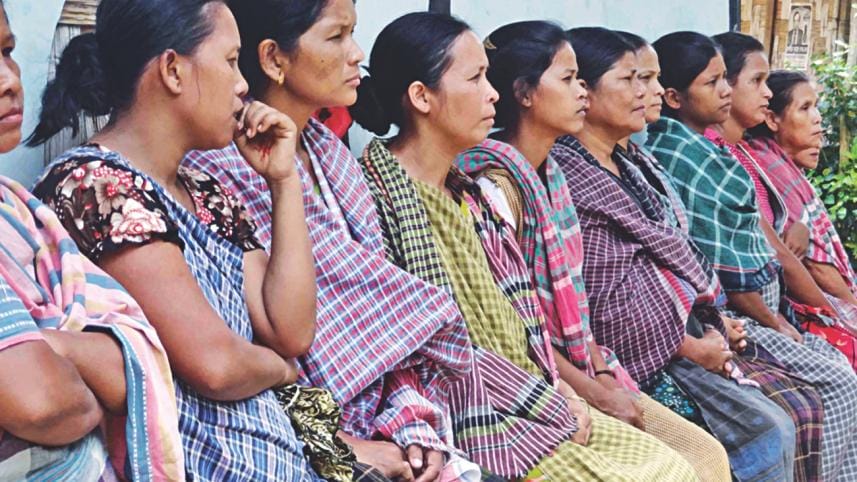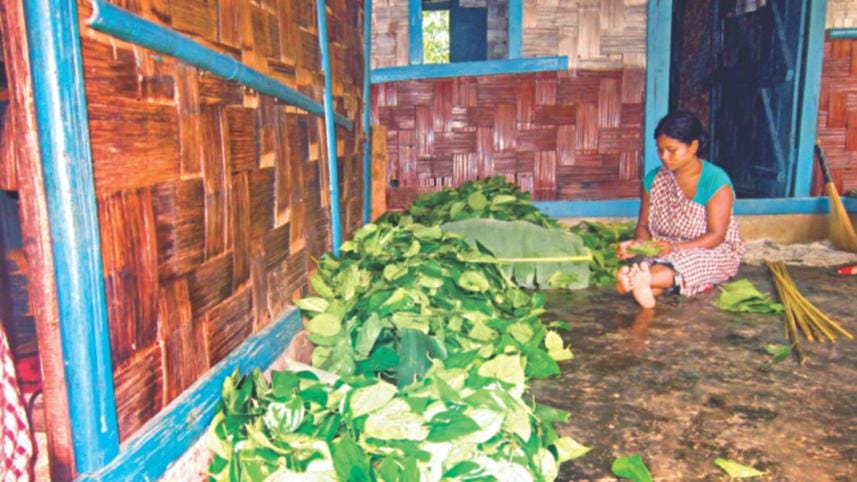700 Khasi people set to lose their homesteads

Women sit in a yard trying to sort betel leaves but their heavy hearts barely allow it. The elderly who counted on predictable sunset years can hardly concentrate on basic chores. Children are confused; parents without hope. The collective mood in the two Khasi villages collectively known as Nahar Punjee, set amidst hillocks in the back blocks of Moulvibazar's Srimangal and home to around 700 Khasis, is one of devastation.
On 30 May 2016 Nahar's villagers were issued notice by the government to vacate 150 acres of the 250-acre Nahar Punjee area by June 12, or face forcible eviction.
The notice accuses the Khasis of illegally occupying government land, though the villages and adjoining betel gardens from which they earn a livelihood have existed for generations. “With respect to the land listed as government land that we have long used,” says village headman Dibarmin Potam, “We have always paid our local taxes.”
He claims increased interest by the management of an adjoining tea garden with expansion plans has led, since 2014, to a worsening security environment. Thanks to longstanding Khasi cultivation, the hillsides slated for vacating are also a wealth of timber.
“It's about grabbing the land and trees,” says Helon Amse, 24, a BBA final year student who rushed home from college after learning of the threat to her village on social media. “My grandmother and uncle died here. I want to be laid to rest here. Where should we go? As a Bangladeshi citizen I want justice.”

Among the coming generation she's not alone in questioning her citizenship's value. “I dream to live in a wonderful country where people enjoy full rights,” says Florish Amse, 27. “I am proud to be Khasi because we live in harmony with nature. We have a lot to offer Bangladesh. Our traditions have increasing relevance in light of climate change.”
While younger generations question their place in a Bengali-majority nation, for the elderly the news is entirely disabling. “I was happy that my grandson got married,” says 80-year-old Rony Sumer, who is blind. “That good news is now meaningless because the government is taking our traditional land, including my grandson's land.”
“If I could see and had energy,” she says, “I must stand in my betel garden and tell them to shoot me first. I'm too old to work. Where will I earn money? Better to let me die.”
Neighbour Larsing Dhar, 70, agrees. “I want to die in peace here. Since I heard the news I cannot close my eyes. I can't focus on any ordinary task. I'm panic-stricken from thinking how to support my children's ongoing education without my piece of land. How can the government do such a thing to its citizens?”
At age 90, Robi Sutnga, also blind, is one of the punjee's oldest residents. “I've never faced such disaster,” she says, “I can hardly walk, let alone work; but more than that I fear for my great grandchildren's futures. I still hope the government will help us stay.”
“We're not against the authorities. We can discuss any issues,” says Airin Pohlong, 62. “But I wish they would visit us in person to properly appreciate how we will suffer if this decision goes ahead. Except for betel gardens, what other work do I know?”
Even local children feel the future is at risk. “I hoped to continue my study at a hostel in Moulvibazar eventually,” says 11-year-old Arkid Pohshyat, currently enrolled at Kashinath High School. “How can I, if we have no income?”
Beyond the potential detriment to education, while Khasi traditional land ownership isn't always easy to measure with paperwork, as a source of identity and continuity the connection is strong. It's why the current situation, among the 90 affected families, evokes great emotion.
“My grandparents died here,” says Happy Amse, 35. “I won't let go of our ancestral land before my death.”
“If the government doesn't sincerely want to understand our situation,” says Serida Kongwong, 70, in tears, “I must tell them to cut off my head and let my blood flow into the betel garden. I won't move anywhere.”
It's hard to ignore the risk of violence associated with implementation of the local administration's decision or to understand how it is consistent with the goal of an inclusive Bangladesh.
Rights activists, politicians and environmentalists have demanded the matter be investigated by the National Human Rights Commission.
Moulvibazar's additional deputy commissioner of revenue, Prokash Kanti Chowdhury, who signed the eviction notice, told The Daily Star it reflects a decision taken by higher authorities.



 For all latest news, follow The Daily Star's Google News channel.
For all latest news, follow The Daily Star's Google News channel.
Comments